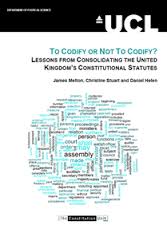To Codify or Not To Codify? Lessons from Consolidating the United Kingdom’s Constitutional Statutes
• Only a few countries in the world lack a codified constitution. The UK is one of those countries. This has prompted some to advocate for the codification of the UK’s constitution. Perhaps the most notable proponents of such a position, at least recently, are the members of the Political and Constitutional Reform Committee (PCRC), but they are certainly not the only actors to champion this position.
• This report contributes to the debate over codification of the UK’s constitution by comparing the contents of the existing written elements of the UK’s constitution to other countries’ constitutional texts. In doing so, we are able to identify, with great precision, the topics addressed in other countries’ constitutions but omitted from constitutionally relevant statutes in the UK. Reflecting on the topics ‘missing’ from the UK’s constitution offers three lessons for those contemplating further codification of the UK’s constitution:
1. Much of the UK’s constitutional order is already written down in statute form.
2. Many details about the executive, the legislature and the relationship between these two branches of government are regulated entirely by convention. These are the parts of the UK’s constitution that are most vulnerable to conflicting interpretations and should be prioritised if more of the UK’s constitution is codified.
3. Further codification is not essential. Much of what is uncodified has recently been incorporated into the Cabinet Manual and other texts. In addition, the parts of the UK’s constitution that remain uncodified are also the parts of the constitutional order where conventions are the most well-established. As a result, codifying these elements would likely have minimal impact on day-to-day politics.
